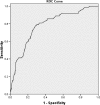Development and validation of a brief screening instrument for psychosocial risk associated with genetic testing: a pan-Canadian cohort study
- PMID: 23485718
- PMCID: PMC3612753
- DOI: 10.1136/bmjopen-2012-002227
Development and validation of a brief screening instrument for psychosocial risk associated with genetic testing: a pan-Canadian cohort study
Abstract
Objectives: To develop a brief, reliable and valid instrument to screen psychosocial risk among those who are undergoing genetic testing for Adult-Onset Hereditary Disease (AOHD).
Design: A prospective two-phase cohort study.
Setting: 5 genetic testing centres for AOHD, such as cancer, Huntington's disease or haemochromatosis, in ambulatory clinics of tertiary hospitals across Canada.
Participants: 141 individuals undergoing genetic testing were approached and consented to the instrument development phase of the study (Phase I). The Genetic Psychosocial Risk Instrument (GPRI) developed in Phase I was tested in Phase II for item refinement and validation. A separate cohort of 722 individuals consented to the study, 712 completed the baseline package and 463 completed all follow-up assessments. Most participants were female, at the mid-life stage. Individuals in advanced stages of the illness or with cognitive impairment or a language barrier were excluded.
Interventions: Phase I: GPRI items were generated from (1) a review of the literature, (2) input from genetic counsellors and (3) phase I participants. Phase II: further item refinement and validation were conducted with a second cohort of participants who completed the GPRI at baseline and were followed for psychological distress 1-month postgenetic testing results.
Primary and secondary outcome measures: GPRI, Hamilton Depression Rating Scale (HAM-D), Hamilton Anxiety Rating Scale (HAM-A), Brief Symptom Inventory (BSI) and Impact of Event Scale (IES).
Results: The final 20-item GPRI had a high reliability-Cronbach's α at 0.81. The construct validity was supported by high correlations between GPRI and BSI and IES. The predictive value was demonstrated by a receiver operating characteristic curve of 0.78 plotting GPRI against follow-up assessments using HAM-D and HAM-A.
Conclusions: With a cut-off score of 50, GPRI identified 84% of participants who displayed distress postgenetic testing results, supporting its potential usefulness in a clinical setting.
Figures
References
-
- Lerman C, Croyle RT. Emotional and behavioral responses to genetic testing for susceptibility to cancer. Oncology (Williston Park) 1996;10:191–5, 9; discussion 200–2. - PubMed
-
- Bleiker EM, Hahn DE, Aaronson NK. Psychosocial issues in cancer genetics—current status and future directions. Acta Oncol 2003;42:276–86 - PubMed
-
- Wellisch DK, Lindberg NM. A psychological profile of depressed and nondepressed women at high risk for breast cancer. Psychosomatics 2001;42:330–6 - PubMed
-
- Broadstock M, Michie S, Marteau T. Psychological consequences of predictive genetic testing: a systematic review. Eur J Hum Genet 2000;8:731–8 - PubMed
LinkOut - more resources
Full Text Sources
Other Literature Sources

